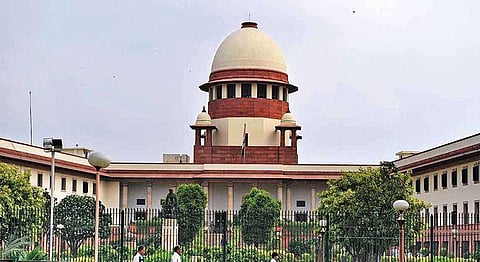
- HOMEGROWN WORLD
- #HGCREATORS
- #HGEXPLORE
- #HGVOICES
- #HGSHOP
- CAREERS
- ABOUT US
- CONTACT US

The Supreme Court of India is being spoken about a lot of late, and for a very good reason at that. Championing women empowerment, promoting gender equality, questioning infringement of privacy, unabashedly rooting for what is just and spreading the message that love is love, it is safe to say that in the last few weeks, the Supreme Court of India has made some incredibly forward-thinking, landmark judgements. The Supreme Court’s ruling not only majorly changed the way the citizens of India viewed the judiciary but has also played a huge role in restoring faith that, if not lost was definitely wobbly.
With Chief Justice of India Dipak Misra’s tenure coming to end, we at Homegrown decided to help you recapitulate the highlights of this eventful month and put together a list of iconic judgements passed by the Supreme Court of India in September 2018.
September 6, 2018, will be etched in Indian history as the day when love triumphed. The Supreme Court’s verdict on Section 377 of the Indian penal code redefined the meaning of democracy for the country. This archaic law that originated while India was still colonised penalised all sexual activities “against the order of nature“ bracketing homosexuality with something as extreme as bestiality.
In July 2018 a five-membered Constitutional bench led by Chief Justice of India Dipak Misra and comprising Justices Rohinton Nariman, A. M. Khanwilkar, D. Y. Chandrachud and Indu Malhotra began hearing petitions against Section 377 and finally delivered the verdict in September 2018. Apart from the verdict itself being a massive step towards the country being inclusive, what touched most was the iconic statements made by the members of the bench in the judgement. “History owes an apology to the members of this community and their families, for the delay in providing redressal for the ignominy and ostracism that they have suffered through the centuries. The members of this community were compelled to live a life full of fear of reprisal and persecution,” said Justice Indu Malhotra. This judgement changed lives across the country and gave many the right to unapologetically own their identity in its entirety.
II. Supreme Court’s verdict on the validity of Aadhar card
The Supreme Court of India on September 26, 2018, declared Aadhaar card a “document of empowerment” and an “unparalleled” proof of identification. The five-membered constitution bench led by Chief Justice Dipak Misra’s verdict deemed Aadhaar mandatory for the filing of income tax returns and for the allotment of a PAN card. According to the bench the Aadhar Act does not breach privacy, but at the same time struck down provisions that threatened to expose unwarranted personal information.
The Aadhaar Act was upheld by a 4:1 majority, with only Justice D.Y. Chandrachud dissenting. Provisions that required mobile phones and bank accounts to be linked with Aadhaar cards have been struck down. The initial petition filed raised questions about Aadhaar being mandatory with the major point of contention being an infringement of the right to privacy.
This judgement is iconic for the mere fact that it recognised the importance of agency irrespective of gender. On September 27, 2018, the Supreme Court of India struck down Section 497 of the Indian Penal Code (IPC), which termed adultery as a criminal offence. “Husband is not the master of the wife, any law which affects individual dignity, equality of women in a civilised society invites the wrath of the Constitution,” said Chief Justice Dipak Misra post the Supreme Court’s judgement. Chief Justice Misra led the Supreme Court bench that presided over this case, the five-judged bench also comprised of Justices Rohinton Nariman, A.M. Khanwilkar, D.Y. Chandrachud and Indu Malhotra.
Terming adultery as a criminal offence was not the only problematic aspect of this archaic law. It was discriminatory to both men and women. As per the law, women could not be punished as abettors and the men involved would be charged for being seducers with the possibility of being imprisoned for a maximum of five years – the law was clearly biased and it also positioned woman as the property of men. Also, the law was only applicable to adultery committed by a woman, that is, the law did not allow women to file complaints against their adulterous husband. However, the most convoluted aspect of this law is the fact that if the husband of the woman involved were to give his consent with respect to her adulterous relationship, the act of adultery would no longer be viewed as an offence.
“Devotion cannot be subjected to gender discrimination,” declared the Supreme Court of India as they delivered their judgement on the entry of women in Sabarimala Temple. With a 4:1 majority, what came as a surprise is that the only member of the bench to dissent was its only female member — Justice Indu Malhotra. The judgement was passed on September 28, 2018, a day after the decriminalisation of adultery by the Supreme Court.
“Woman is not lesser or inferior to man. Patriarchy of religion cannot be permitted to trump over faith. Biological or physiological reasons cannot be accepted in freedom for faith. Religion is basically [a] way of life however certain practices create incongruities,” said Chief Justice Dipak Misra while reading out his and Justice A.M. Khanwilkar’s joint statement. Justice Rohinton Nariman and Justice D.Y. Chandrachud concurred while Justice Indu Malhotra seemed to disagree as she stated, “The Sabarimala shrine and deity is protected by Article 25 of the Constitution of India. Notions of rationality cannot be brought into matters of religion.”
This judgement made by the Supreme Court of India contributes greatly towards the fight for gender equality in a country that is so gravely plagued by patriarchal constructs.
If you liked this article we suggest you read:
